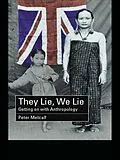In "They Lie, We Lie," Peter Metcalf gives an engaging account of his fieldwork in Borneo, telling the story of his tortuous relationship with Kasi, a formidable old lady who, for twenty years, tried to strictly control what he learned about her community. The author examines the puzzles and contradictions of life in the field drawing out what such personal predicaments have to say about anthropology in a post-colonial world. The result is an account that is accessible to those unfamiliar with the contemporary critiques of anthropology, and useful to those who are only too familiar with them.
Autorentext
Peter Metcalf has conducted research in Borneo for over two decades. He is Professor of Anthropology at the University of Virginia, USA.
Zusammenfassung
They Lie, We Lie is an attempt by an experienced fieldworker to engage recent critiques in ethnography, that is the writing of culture, made both from within anthropology and from such disciplines as cultural studies and post-colonial theory. This is necessary because there has been a polarization within anthropology between those who react dismissively to what Marshall Sahlins calls 'afterology' and those who find the critiques so crippling as to make it hard to get on with anthropology at all. Metcalf bridges this divide by analyzing the contradictions of fieldwork in connection with a particular 'informant', a formidable old lady who tried for twenty years to control what he would and would not learn. At each stage, the author draws out the general implications of his predicament by making comparisions to the most famous of all fieldwork relationships, that between Victor Turner and Muchona.The result is an account that is accessible to those unfamiliar with the current critiques of ethnography, and helpful to those who are only too familiar to them. His discussion shows, not how to evade the critiques, but how in fact anthropologists have coped with the existential dilemmas of fieldwork.
Inhalt
CHAPTER ONE: LIES 1. Something spoken which is not true 2, They lie, we lie 3. Getting on with anthropology CHAPTER TWO: STRUGGLE 1. Learning experiences 2. Kasi's pre-emptive strike 3. The polite fictions of research proposals 4. Kasi throws up her defenses 5. The siege 6. My fifth column CHAPTER THREE: POWER 1. Hearts and minds 2. Colonial involvements 3. Going into the villages 4. People invisible to the state CHAPTER FOUR: ETHNICITY 1. Lelakness 2. The vanishing point 3. Foregrounding the Berawan 4. Lost tribes 5. The true Berawan 6. Keeping things in perspective CHAPTER FIVE: CLOSURE 1. Lelak 2. Throwing away the old way 3. Kasi's vanishing 4. Cultural obituaries 5. Indignities 6. Demolishing Upriver 7. Constructing Upriver People 8. No closure FOOTNOTES BIBLIOGRAPHY
